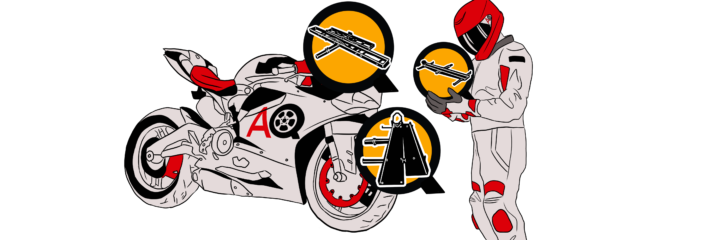While it’s sad that you can’t always ride your bike everywhere, getting a hitch carrier for your vehicle will enable you to take your baby with you wherever you go. Whether you’re taking your bike to the track, dirt trails, or the mechanic, a hitch carrier has got you covered. Renting a garage at a track can get expensive, and since track bikes and dirt bikes aren’t always road legal, hauling your machine there will avoid any legal issues. Having a good hitch carrier is also great for getting your kid’s bike to the track without you having to worry, or resort to improvised solutions such as squeezing the bike into the backseat of your car.
Obtaining a piece of equipment to transport your motorcycle, whether it’s a trailer or a hitch carrier, is an investment for future peace of mind. A need may arise to transport your bike, and to make it a good experience, learning a little about the carriers will help with choosing an appropriate one that can safely haul your bike. The full guide with some extra tips is at the bottom of the article, but first, let’s introduce some basics to consider when shopping around for a new carrier.
- Factors to Consider When Purchasing a Motorcycle Hitch Carrier
- Top 9 Best Motorcycle Hitch Carriers 2026
- 1. Best Overall Motorcycle Hitch Carrier: Black Widow MCC-500 Steel Motorcycle Carrier
- 2. Best Motorcycle Hitch Carrier for Small Bikes: Black Widow AMC-400 Hitch-Mounted Motorcycle Carrier
- 3. Best Premium Motorcycle Hitch Carrier: Versa Haul VH-SPORT Sport Bike Carrier
- 4. Best Motorcycle Hitch Carrier for Large Bikes: Black Widow SMC-600R Deluxe Steel Motorcycle Carrier
- 5. Best Motorcycle Hitch Carrier With a Long Ramp: ECOTRIC 600LBS Black Steel Motorcycle Carrier
- 6. Best Motorcycle Hitch Carrier for Wide Tires: Goplus 600 LBS Motorcycle Carrier
- 7. Best Double Motorcyle Hitch Carrier: MotoGroup ST3402 Double Dirt Bike Carrier
- 8. Best Lightweight Motorcycle Hitch Carrier: MotoGroup ST3401 Motorcycle Carrier
- 9. Best Budget Motorcycle Hitch Carrier: Best Choice Products SKY1375 Anti-Tilt Motorcycle Carrier
- Guide to Picking the Best Hitch Carrier for your Motorcycle
- Final Thoughts
Factors to Consider When Purchasing a Motorcycle Hitch Carrier
Size of Your Bike
First, you should check the dimensions and the weight of your motorcycle. The dimensions are important: in particular the tire size as wider tires may not fit the track of the carrier. Off-road bikes have a maximum tire width of 5 inches, which will fit onto any carrier. For street bikes, a 5-inch rear tire is common, with sports bikes’ tires getting closer to 8 inches in width.
Hitch carriers are most suited to loads under 600 lbs, which excludes touring bikes and big choppers. Dirt bikes and scooters are light and will do great on a hitch carrier. Sports bikes, cruisers and adventure bikes (ADV) are heavy and bulky and some may be too heavy for a hitch carrier while others will do fine.
Hitch Receiver Classification
Hitch receivers are classed according to the capability of towing loads and the two most important factors are the Gross Trailer Weight (GTW) and Tongue Weight (TW). The table below is a quick summary of each class and the load limits.
Class | GTW | TW | Receiver tube size
I | 2,000 lbs | 200 lbs | 1 1⁄4 in
II | 3,500 lbs | 300 – 350 lbs | 1 1⁄4 in
III | 5,000 lbs | 500 lbs | 2 in
IV | 10,000 lbs | 1,000 – 1,200 lbs | 2 in
V | 17,000 lbs | 1,400 lbs | 2 or 2 ½ in
For heavier loads, a bigger receiver tube is required which results in different classes having different receiver tubes. Choosing the right class is integral, otherwise your new carrier simply won’t fit.
The Load Capacity of Your Vehicle
Your towing vehicle’s tongue weight, as well as the class of a hitch receiver, is important to consider as you will be subjecting your car’s frame to sizable loads. Making sure the entire structure is balanced is important to ensure the safe transportation of your precious bike.
Limitations of the Carrier
The weight capacity of the hitch carrier is an important factor when determining if the carrier is suitable. Forget about transporting your Goldwing – touring bikes are just too heavy to transport using a hitch carrier and are better transported on a trailer or in a van. Make sure the wet weight of your bike doesn’t go over the stated capacity – preferably the weight should be well under the limit.
It is also important to note that while the design of a hitch carrier is much more compact than that of a full trailer, you will still be limited to the same speed limit of 55 mph.
Budget
If you’re on a bit of a budget and need to transport your bike quite urgently – getting a hitch carrier is cheaper than the standard trailer and it will do the job just fine. There are however some more premium options such as Versa Haul VH-SPORT if you want a more long term solution to the transport of your bike.
We’ll go into more detail later, so don’t worry if you don’t quite have the full picture yet—but now that you’re armed with the basics of how to select the right motorcycle hitch carrier for you, let’s get into the best options on the market today.
| Product | Load capacity | Hitch receiver categories | Max wheel width | Track length | Dimensions | Weight | Rating |
|---|---|---|---|---|---|---|---|
| Black Widow MCC-500 Steel Motorcycle Carrier | 500 lbs | III, IV | 5” | 75” | 75.8 x 6.9 x 10 inches | 57 lbs | 5 |
| Black Widow AMC-400 Hitch-Mounted Motorcycle Carrier | 400 lbs | III, IV | 5” | 75” | 75 x 5.5 x 7 inches | 36 lbs | 5 |
| Versa Haul VH-SPORT Sport Bike Carrier | 600 lbs | III, IV | 8” | 77.5” | 77.5 x 36 x 8 inches | 78 lbs | 5 |
| Black Widow SMC-600R Deluxe Steel Motorcycle Carrier | 600 lbs | III, IV | 7.5” | 79” | 78.75 x 8 inches | 99 lbs | 4.5 |
| ECOTRIC 600LBS Black Steel Motorcycle Carrier | 600 lbs | III, IV | 8” | 79” | 72 x 7.5 inches | 95 lbs | 4.5 |
| Goplus 600 LBS Motorcycle Carrier | 601 lbs | III, IV | 8” | 79” | 79 x 8 inches | 98 lbs | 4 |
| MotoGroup ST3402 Double Dirt Bike Carrier | 600 lbs – 300 per bike | III, IV, V | 5.5” | 75” | Not given | 70 lbs | 4 |
| MotoGroup ST3401 Motorcycle Carrier | 400 lbs | II, III, IV, V | 5.5” | 75” | 79 x 9 x 5 inches | 40 lbs | 4 |
| Best Choice Products SKY1375 Anti-Tilt Motorcycle Carrier | 500 lbs | II, III, IV, V | 7” | 76” | 76 x 7 x 1 inches | 51 lbs | 3.5 |
Top 9 Best Motorcycle Hitch Carriers 2026
1. Best Overall Motorcycle Hitch Carrier: Black Widow MCC-500 Steel Motorcycle Carrier
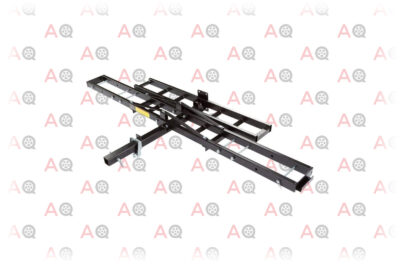
Editor’s Rating:
Specs:
- Load capacity: 500 lbs
- Hitch receiver categories: III, IV
- Max wheel width: 5”
- Track length: 75”
- Dimensions: 75.8 x 6.9 x 10 inches
- Weight: 57 lbs
This model from Black Widow not only looks great but is able to handle more than just light dirt bikes. The loading capacity is 500 lbs, which is great if you have a naked bike or a light sports bike. While this product won’t handle some of the heavier bikes out there, it represents the best value for money on this list.
Design and Construction
The carrier is made out of powder-coated steel, looking sleek while providing rust protection and a robust construction. The track uses bolts as support for the tires, and over time may loosen up so checking up on them is advised. The ramp, however, comes with welded bars.
The track will accommodate wheels up to 5 inches wide, and the supplied ramp is sufficiently long at 45.5 inches and will mount on either side of the track.
Installation and use
The product comes with an anti-tilt device as well as a ⅝-inch hitch pin which ensures a swift installation of the unit. However, no other accessories such as a wheel chock, to keep the motorcycle wheels from sliding around during transport, are included.
Pros
- Long ramp provided which installs on either side of the track
- Comes with an anti-rattle device
- Hitch pin is included
- Attractive design
Cons
- Bolts instead of welds used for the track
- No wheel chock included
2. Best Motorcycle Hitch Carrier for Small Bikes: Black Widow AMC-400 Hitch-Mounted Motorcycle Carrier
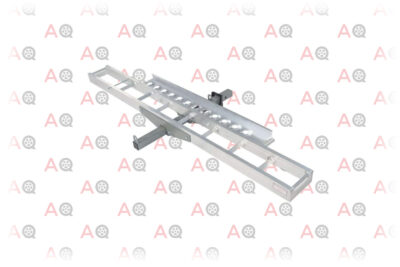
Editor’s Rating:
Specs:
- Load capacity: 400 lbs
- Hitch receiver categories: III, IV
- Max wheel width: 5”
- Track length: 75”
- Dimensions: 75 x 5.5 x 7 inches
- Weight: 36 lbs
A close competitor to the Black Widow MCC-500, this model is better suited for smaller bikes. Although this carrier has a smaller load capacity, it can handle the advertised weight without any issues.
Design and Construction
The carrier has full aluminum construction, preventing rust completely, although it may not look as nice as some of the other options. The lightweight aluminum brings the total weight of the product down to a mere 36 lbs. The track bolts from the MCC-500 model have been replaced with welds which is definitely an improvement.
The ramp supplied is textured to increase traction, measures 47 inches, and can be installed on either side of the track making the loading much easier due to the decreased slope. As a downside, the ramp is a bit tricky to attach and detach.
Installation and Use
The product includes an anti-rattle device and spacer bar adapter to fit youth bikes (50-80 cc) making it the perfect option if you’re trying to get your kid into the joy of riding. The spacer bar will fit to the front of the track, making the front wheel gap smaller. You can transport your own full-sized bike, such as a Honda Rebel 300, as long as it comes under the weight limit of 400 lbs.
Pros
- Welded construction
- Includes spacer bar for smaller bikes
- Lightweight aluminum design
Cons
- Smaller load capacity
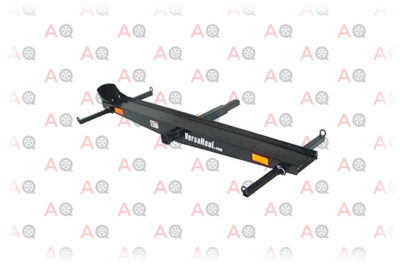
Editor’s Rating:
Specs:
- Load capacity: 600 lbs
- Hitch receiver categories: III, IV
- Max wheel width: 8”
- Track length: 77.5”
- Dimensions: 77.5 x 36 x 8 inches
- Weight: 78 lbs
If you want a premium carrier for your bike, this is it. Made in the USA with a patented design, it is a simple product which includes a carrier only. Rated at 600 lbs, it can handle big bikes perfectly. The sleek design looks great and will complement any of your beautiful sports bikes. Despite the price, it’s a serious contestant, especially if you don’t mind forking out a few dollars more to give your bike the treatment it deserves.
Design and Construction
The carrier is made out of heavy-duty steel and sports a stealthy black finish. It has a longer and wider track at 77.5” long and almost 8 inches wide, which makes it the best option on this list if your bike has very wide tires or has been stretched to high heaven.
As the track is solid and painted, it has a smooth finish which may become slippery when wet. It may come with a hefty price tag, but at 78 lbs you are getting a serious piece of equipment for your money.
Installation and Use
As this product doesn’t come with a loading ramp you will need to provide one yourself to load up your bike (this one works great), which you may need to factor in to your budget. Although the product is rated for class III hitch receivers, you still should abide by the maximum load of your hitch. Of course, if your bike weighs under 500 lbs and you have a class III receiver installed, you will do perfectly well with this product.
Pros
- Big loading capacity
- Designed and made in the USA
- Includes track wheel stop
Cons
- Doesn’t include loading ramp
- Not the most affordable
4. Best Motorcycle Hitch Carrier for Large Bikes: Black Widow SMC-600R Deluxe Steel Motorcycle Carrier
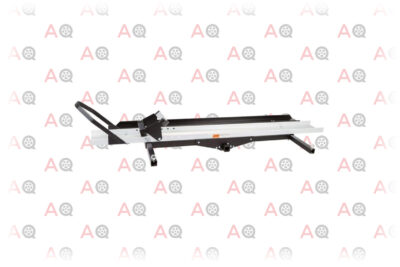
Editor’s Rating:
Specs:
- Load capacity: 600 lbs
- Hitch receiver categories: III, IV
- Max wheel width: 7.5”
- Track length: 79”
- Dimensions: 78.75 x 8 inches
- Weight: 99 lbs
Black Widow has designed this product for loads up to 600 lbs and class III and IV hitch receivers. The carrier combines the best of both worlds, having a black powder-coated steel construction with a track made out of aluminum that simply looks cool.
Design and Construction
Rated to handle a load of 600 lbs, the steel construction provides all the strength necessary to transport your bike. Black Widow did away with the rung design seen in models AMC-400 and MCC-500, and instead, the track is made out of solid lightweight aluminum. The full aluminum track results in good support for any pair of wheels, without the unnecessary weight.
While the solid 79-inch track will accommodate almost any set of tires up to 7.5 inches in width, the surface is not textured and so some slipping may occur during wet spells.
The hitch comes with an anti-rattle device, a ⅝-inch hitch pin, and a long ramp measuring 72 inches in length.
Installation and Use
The carrier includes a long 72-inch ramp for easy loading and unloading, which can mount to either side of the track. The built-in adjustable wheel chock is a very welcome feature, saving you from having to get your own.
This piece of equipment is perfect for motorcycles, dirt bikes, and scooters with wheels up to 7.5 inches wide, as long as you have a 2-inch class III or IV hitch receiver.
Pros
- Extra-long 72" loading ramp
- Hitch pin included
- Solid aluminum track
- Built-in adjustable wheel chock
Cons
- The track is not textured for added grip
5. Best Motorcycle Hitch Carrier With a Long Ramp: ECOTRIC 600LBS Black Steel Motorcycle Carrier
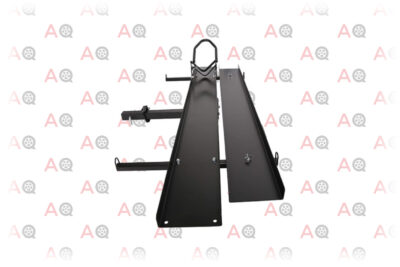
Editor’s Rating:
Specs:
- Load capacity: 600 lbs
- Hitch receiver categories: III, IV
- Max wheel width: 8”
- Track length: 79”
- Dimensions: 72 x 7.5 inches
- Weight: 95 lbs
While cheaper than the Versa Haul, this is a similar design carrier that is just more affordable. However, it being more affordable does mean some corners being cut. Regardless, it’s still sturdy enough for most bikes, but despite the 600-lb load limit, we would say this is more suitable for bikes closer to 500 lbs than 600 lbs.
Design and Construction
The construction of the carrier is made out of steel with a black powder-coated finish to prevent rusting. While the product looks neat, it’s not particularly hefty, seemingly using pretty thin steel. It’s similar in size to the Versa Haul model, but it also comes with a ramp measuring 72 inches – almost as long as the track itself at 79 inches.
Both the track and the ramp have a smooth finish, making the entire loading and unloading process slippy, if not dangerous, when it’s raining and the wheels are wet.
Installation and Use
While rated at 600 lbs, make sure to not exceed a load of 500 lbs if you have a class III hitch receiver. The carrier mounts using a 2-inch receiver and comes with a 3/4 inch hitch pin. The rail has a raised adjustable wheel stop, which works the same as a wheel chock.
The long ramp provided will result in a shallower slope, making the loading and unloading of your bike much easier.
Pros
- Comes with a very long ramp
- Wheel stop included
- Hitch pin included
Cons
- Potentially slippery surface
6. Best Motorcycle Hitch Carrier for Wide Tires: Goplus 600 LBS Motorcycle Carrier
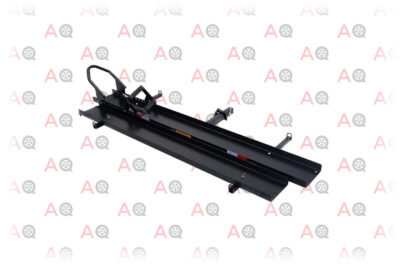
Editor’s Rating:
Specs:
- Load capacity: 600 lbs
- Hitch receiver categories: III, IV
- Max wheel width: 8”
- Track length: 79”
- Dimensions: 79 x 8 inches
- Weight: 98 lbs
Very similar in design to the Ecotric carrier this one is also rated at 600 lb capacity. It has a 2-inch receiver making it suitable for class III and IV hitches. It’s a great alternative to other similar products as you can pick out the one that’s available or simply cheaper.
Design and Construction
The steel construction has good strength and is powder-coated black to prevent rust while making it look more appealing. The carrier track is long at 79 inches, and will accommodate tires up to 8 inches in width. The ramp provided is also very long, making the loading process much easier.
Installation and Use
Although identical in design to the Ecotric carrier, this product loses points for the extremely limited maximum speed – the manufacturer of this model advises to limit the speed to 45 mph, which is much lower to the standard recommended 55 mph.
The carrier comes with a ¾ inch hitch pin as well as an adjustable wheel chock to stabilize the bike during transport.
Pros
- Hitch pin included
- Features an adjustable wheel chock
- 72-inch ramp provided for easy loading
Cons
- Speed limited to 45mph
7. Best Double Motorcyle Hitch Carrier: MotoGroup ST3402 Double Dirt Bike Carrier
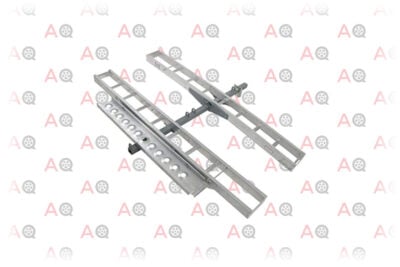
Editor’s Rating:
Specs:
- Load capacity: 600 lbs – 300 per bike
- Hitch receiver categories: III, IV, V
- Max wheel width: 5.5”
- Track length: 75”
- Dimensions: Not given
- Weight: 70 lbs
This product is just like the Motogroup ST3401 single carrier in terms of design, only it is able to carry two bikes. While this carrier is rated at 600 lbs (300 lbs per bike), this is misleading due to the inevitable torque applied to your hitch. It is advised to only use this carrier if you need to transport dirt bikes or light scooters, each preferably at around 200 lbs or lighter. Although there may seem a lot of criticism, as long as you’re wary of the loading weight this product is perfect for transporting your kids’ bikes, or any other light motorcycle.
Design and Construction
The carrier is made of lightweight aircraft aluminum, which may seem like a sensible choice, as you don’t want the carrier to weigh more than the bikes! However, aluminum will not be strong enough to safely support large loads on the outside track, so only relatively small bikes will work here.
Just like the ST3401 carrier, this product features the anti-wobble system which uses three locking screws to prevent wobble.
Despite the manufacturer claims of this carrier being suitable for any hitch receiver that has a 2-inch square tube, it’s best used on class IV receivers due to the high torque inadvertently applied. The bikes sit 17 inches apart with the entire rack sticking out 53 inches away from the car, resulting in a lot of pressure on the mount point, and hence your vehicle’s frame.
Installation and Use
As standard, the ramp supplied will enable you to load your bike from either side. Although this product will carry two bikes, one ramp is supplied. The ramp also has an improved ¾-inch hook, minimizing the chances of the ramp popping off while loading.
Due to the torque applied to the hitch, the load capacity will be much lower – particularly for the outside track. To minimize the forces applied, as one bike sits closer to the car than the other, it is advised to put the lighter bike on the outside and the heavier bike next to the mount point.
Pros
- Can carry 2 bikes
- Solid construction if used appropriately
- Perfect for dirt bikes
Cons
- Sticks out quite a lot behind the vehicle
- Best for class IV receivers
- Not suitable for 2 large bikes
8. Best Lightweight Motorcycle Hitch Carrier: MotoGroup ST3401 Motorcycle Carrier
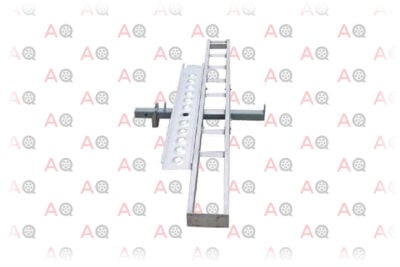
Editor’s Rating:
Specs:
- Load capacity: 400 lbs
- Hitch receiver categories: II, III, IV, V
- Max wheel width: 5.5”
- Track length: 75”
- Dimensions: 79 x 9 x 5 inches
- Weight: 40 lbs
Identical in design to the Black Widow AMC-400, the manufacturer claims this carrier to be suitable for class II receivers in addition to class III and IV, despite the carrier coming with a 2-inch tube. While class II receivers are designed for 1¼-inch mounting tubes, if you happen to have a class II 2-inch receiver, this product should do the job well. In such a case the load should not exceed 350 lbs, making the product useful only for very small bikes.
Specification
The main frame of the carrier is made of lightweight aircraft aluminum which prevents rusting, while the subframe is grey powder-coated steel. Having the aluminum frame, it’s suitable for lighter bikes and scooters which will not put as much stress on the construction.
The track is 75 inches long and will fit tires up to 5.5 inches wide. The anti-wobble system supplied uses three locking screws, decreasing potential wobble.
Installation and use
The supplied ramp will fit on either side of the track and is decently long at 4.7 inches. As the product is pretty much a carbon copy of the suitability of the Black Widow AMC-400, it’s an alternative to consider when it comes down to price and availability. As one of the lightest motorcycle hitch carriers we recommend, it’s very easy to install.
Pros
- Steel sub-frame for added support
- Anti-wobble uses 3 locking screws for improved stability
- Lightweight construction
Cons
- Low carrying capacity
- Questionable claims
9. Best Budget Motorcycle Hitch Carrier: Best Choice Products SKY1375 Anti-Tilt Motorcycle Carrier
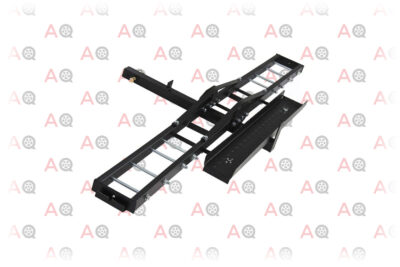
Editor’s Rating:
Specs:
- Load capacity: 500 lbs
- Hitch receiver categories: II, III, IV, V
- Max wheel width: 7”
- Track length: 76”
- Dimensions: 76 x 7 x 1 inches
- Weight: 51 lbs
Designed to handle loads up to 500 lbs, it is one of the most affordable options while remaining sturdy enough to handle your bike. Although it’s listed for hitch receivers of class II and III, as long as it’s a 2-inch square tube, you have to remember the weight limitations of the hitch and to not overload this carrier.
Design and Construction
The construction of this carrier is made out of steel that has been powder-coated black, providing a neat finish to the product as well as rust protection. The track design has rungs which decrease the weight of the carrier while preventing the motorcycle from rolling back and forth during transport, even if you don’t have a wheel chock.
The product comes with an anti-tilt locking device, however it’s not of the best quality and might as well not be included. The ramp provided is textured for added grip while loading and unloading your bike, however it is very narrow at 4.75 inches, and short at 38.5 inches, making the loading difficult.
Installation and Use
The carrier includes tie-down sites on either side of the track just like the vast majority of the carriers on the market. It’s easy to install as the assembly requires only 8 bolts, however, some may find this to be an unnecessary corner-cutting, expecting a sturdier construction.
The metal used is quite thin compared to other carriers on this list, making the entire structure more wobbly. However, if you decide to follow some of our tips, this cheap carrier can be greatly improved for little additional cost.
Pros
- Self-storing ramp installs on either side
- Easy to install
- Affordable
Cons
- Ramp is short and narrow
- Can be wobbly
Guide to Picking the Best Hitch Carrier for your Motorcycle
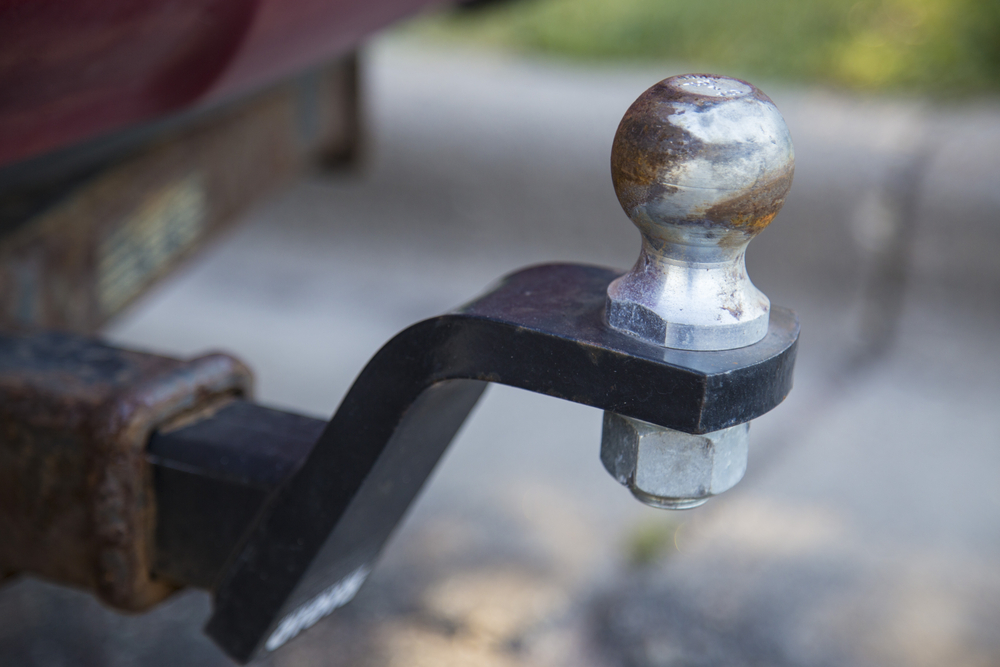
Transporting your motorcycle is a serious business that requires care and some knowledge to do it safely and easily. The process is not complex, and hitch carriers are easy to install as long as you follow your owner’s manuals and manufacturer user guides.
As there are many things to consider, below is a guide through the process to get you going. Some tips are included at the end to really make the most of your new accessory.
Step 1: Prepare Your Vehicle
To make sure your car can handle the job you should ensure that all the right components are in place – namely a receiver type hitch.
The receiver hitch installs to the frame or chassis of your car, resulting in a lot of force and stress being applied to it. It’s crucial to check the towing capacity of your car in the owner’s manual.
The hitch load capacity should match the towing capacity of your car even if you’re not planning on towing heavy loads, to provide a solid structure for any future eventuality.
What Is the Gross Trailer Weight and Tongue Weight?
The GTW is the weight of a fully-loaded trailer, while the TW is the downward force exerted by the trailer’s tongue on the hitch receiver tube. Usually, the tongue weight is 10-15% of the gross trailer weight.
In the case of motorcycle hitch carriers, all of the force is exerted downwards as the carrier is not being towed, but is hanging on the receiver tube. As a result, it’s most important to look at the tongue weight rating of your hitch receiver, and if you have a class III, IV, or V receiver, you’re in luck and good to go.
Step 2: Choosing the Best Hitch Carrier for Your Motorcycle
Once your car is ready, it’s time to consider the carrier itself. The most important aspect is the weight capacity of the carrier, and hence the weight of your bike. It is advisable to err on the side of caution and always keep well below the maximum load capacity of the carrier.
Weight Ratings
The average weight of a motorcycle is linked to the style of the machine, however, this can vary wildly depending on the construction of the bike. Always check the wet weight of your motorcycle in the owner’s manual, but as a quick guide here are some average dry weights of bikes:
Scooters and dirt bikes | 220-250 lbs
Cafe racers | 450 lbs
Sports bikes | 300-500 lbs
ADV and cruisers | 550 lbs
Chopper, bagger, Touring bikes | 700-900 lbs
The gas and oil can add another 45 lbs to the dry weight, so make sure the carrier you choose can handle the total load it will actually need to when it comes time to hit the open road. As long as your wet weight will be less than the rated capacity of the hitch carrier you’ll be fine, but if you’re worried about coming close, you won’t be disappointed by our high-capacity premium pick.
Material
Which material to choose can be important. Both steel and aluminum are rust free, with aluminum having the edge here. However, a steel structure is able to handle bigger loads, so most of the carriers have steel substructures, even if they use aluminum on the outside. If your bike is lighter you can choose either material, but a painted steel construction may simply be more appealing than the industrial looking aluminum option.
Dimensions of the Carrier
The length of your motorcycle, as well as the tire width, is important as most carriers average around 75 inches in length and will fit tires that are up to 5 inches wide.
Length
The average wheelbase length (measured from axle to axle) is around 55 inches for the vast majority of motorcycles, while cruisers can have a much longer wheelbase getting up to 72 inches, such as the Harley-Davidson VRSC, which come in at 67 inches.
This means most bikes will fit most carriers in terms of wheelbase, but you should also consider the overall length of your motorcycle. Make sure you will be comfortable with your bike potentially sticking out on the sides of your vehicle. If you own or plan to own a bike with a very wide wheelbase, the Black Widow SMC-600R Deluxe Steel Motorcycle Carrier should be able to handle anything you throw at it.
Tire Width
With the vast majority of off-road bikes having both tires at 5 inches or less, you’re most likely free to pick any hitch carrier you like. If you do have very wide tires, something like the Goplus 600 LBS Motorcycle Carrier should accommodate nearly any bike.
For street bikes, the tire width gets a little more complex. While most street bikes have tires rated at or below 130/90, which equates to 5-inch width, the bigger motorcycles can get much wider. Sports bikes such as the R6 or CBR600 will have the rear tire rated at 180/55 which is a little over 7 inches. You can check your tire width by looking at the notation on your wheels, and if needed using a converter to get the width in inches.
Accessories
Extra bits and pieces that come with the hitch carrier can be very helpful. Carriers including a wheel chock or spacer bars can greatly aid in keeping your bike secure while in transport.
Spacer Bars
A spacer bar like that included in the Black Widow AMC-400 Hitch-Mounted Aluminum Motorcycle Carrier is a long bolt that fits into the front of the track, acting as an additional rung, making the front wheel gap smaller to prevent the wheels from sagging.
Anti-Tilt/Anti-Rattle Device
An anti-tilt (or anti-rattle) device, such as the one used in the Anti-Tilt Motorcycle Carrier SKY1375, is a metal bracket that is installed on your hitch receiver. Once the carrier is put together and in the correct position, the bolts on the bracket are tightened to prevent excessive movement of the structure while driving.
Wheel Chock
A wheel chock is usually in the form of a curved piece of metal that bolts to the front of the track in order to prevent the bike from rolling off. They also help to stabilize the motorcycle during transport. A few of our recommendations, including the Black Widow SMC-600R Deluxe Steel Motorcycle Carrier include wheel chocks.
While most carriers will come with a ramp for loading and unloading, these can be inferior to ramps bought separately. Often the supplied ramp is too short or too slippy, and investing in a separate ramp can be simply better in the long run.
Step 3: Installation and Loading
Once you’ve determined that your car can handle the load, and your bike will fit the carrier, it’s time to install the carrier to your car. The installation is simple enough, however, you should refer to the installation manual supplied to ensure a safe installation for both your car and, most importantly, your bike.
How to Install the Carrier
You should always follow the user’s guide to install a carrier, but as a quick overview here are the steps required to give you an idea:
- Install the anti-tilt bracket over the hitch bar – make sure it’s the right way round!
- Slide the rack over the trailer hitch and install the hitch pin. The hitch pin is usually sold separately.
- Tighten the anti-tilt bolts securely once the bracket is in the correct position.
While you may think that tighter is better, this can actually weaken the bolts and damage the structure. Either use a torque wrench or simply tighten by hand giving an extra ¼ to a ½ turn using a wrench.
If you want to reduce rattle and ensure a secure fit of the carrier, purchasing a hitch tightener can be an amazing addition.
Securing Your Bike
Securing your machine to the carrier is extremely important not only to your bike but also the hitch carrier and your vehicle. The straps to secure your bike are always sold separately, so you have the freedom to buy whatever you want and as many as you want. It’s important to use a sufficient amount of straps to ensure your bike will stay safe on the rack, and not wobble as you drive. You’re trying to prevent the tires from sliding side to side, the machine rolling forward or back, and the bike falling left or right.
Tire Roll and Slide
Some hitch carriers will come with a wheel chock to prevent the tires from sliding around as you drive but do make sure that both the front and rear wheels are immobilized with extra straps. If a chock isn’t included you can buy one separately, or use straps to prevent the sliding and rolling movements.
Tipping Side to Side
To prevent the bike from tipping you can use ratchet straps on each side of the motorcycle to tie it to the anchor points on the carrier. The anchor points on the motorcycle should be sturdy as quite a bit of force will be applied to these points as you drive. Suitable points would be the main frame, yoke, or the swingarm.
Having extra straps on the handlebars can also help to stabilize the bike and prevent any excessive movement. Just like the bolts, it’s important to not over tighten the straps – you don’t want to tighten so much you bottom out your bike’s suspension. A little give in the suspension is important as it will help immensely with handling rough road surfaces and bumps, and it will make the whole drive smoother and safer for you and your bike. You should aim to have a secure fit so the carrier and the motorcycle act as one, but not so tight it will jitter at every slight bump.
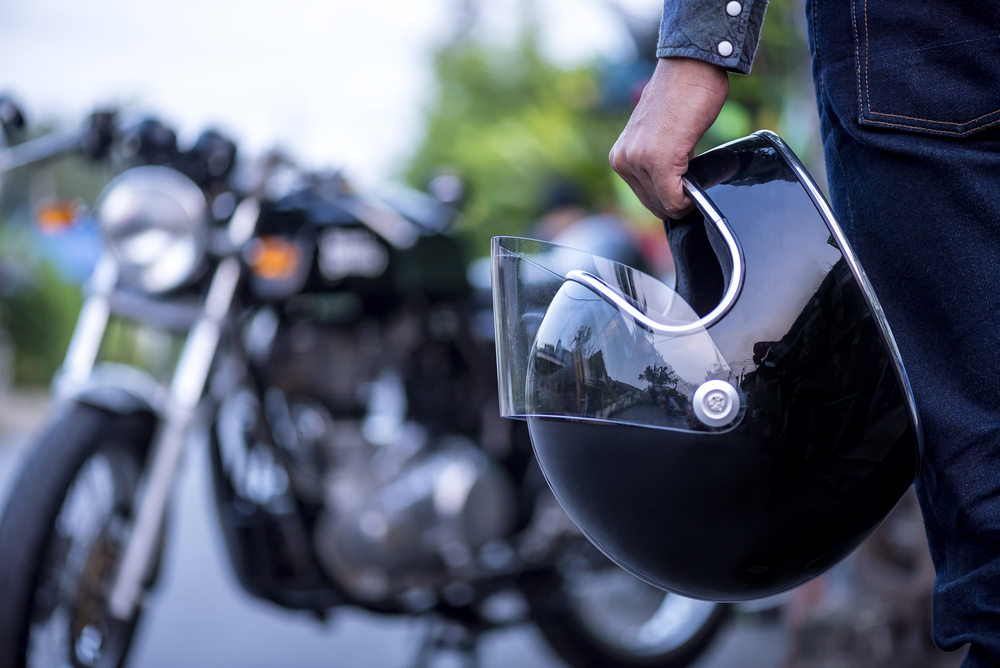
Tips
- Loading from a raised pavement can make the process easier as you decrease the steepness of the ramp.
- If the ramp or the track is too slippy, get some skateboard grip tape and stick it on for extra grip.
- A loaded hitch carrier can obstruct your vision while driving. Think about your visibility and the orientation of your bike.
- To increase your safety, as well as the safety of others, install LEDs or reflective tape to the back of your carrier to alert drivers behind you and minimize the risk of being rear-ended with your bike taking the biggest hit.
- Better quality nuts and bolts (such as class 8.8, 10.9 or 12.9) can greatly improve the stability of a budget carrier as well as give you peace of mind.
Final Thoughts
Whichever carrier you pick, it’s important to follow safety guidelines and not overload your carrier. No matter how expensive your carrier is, putting too much load on it will bend the structure. Each of the hitch carriers on this guide is an excellent option for somebody depending on their needs, so we hope that this guide will have you out enjoying the open road with your motorcycle soon—only this time from your car seat rather than the saddle.
